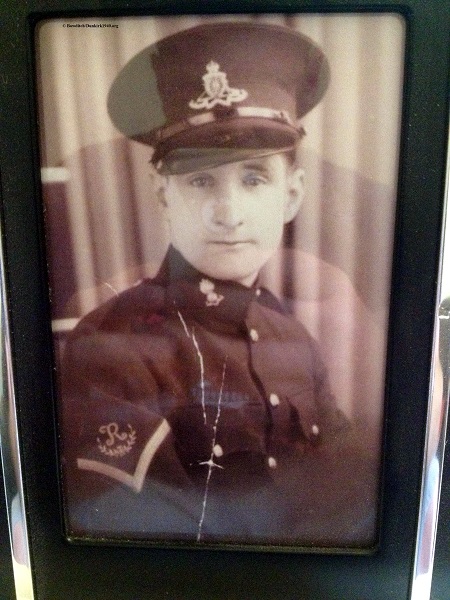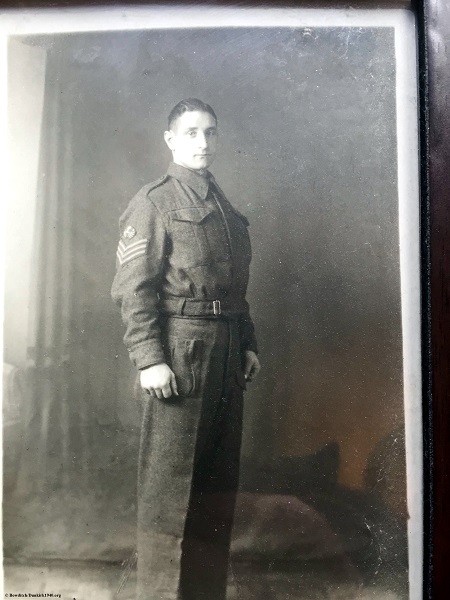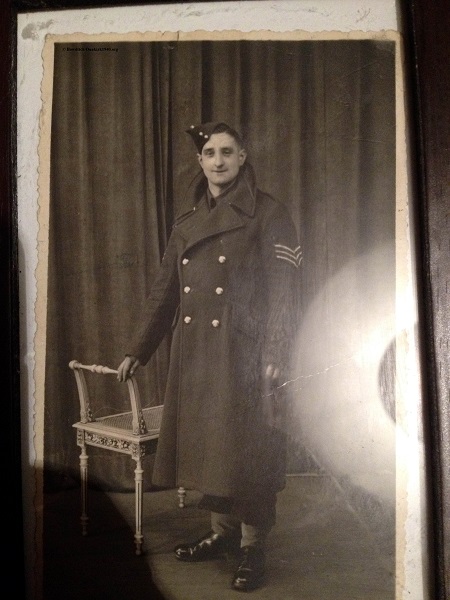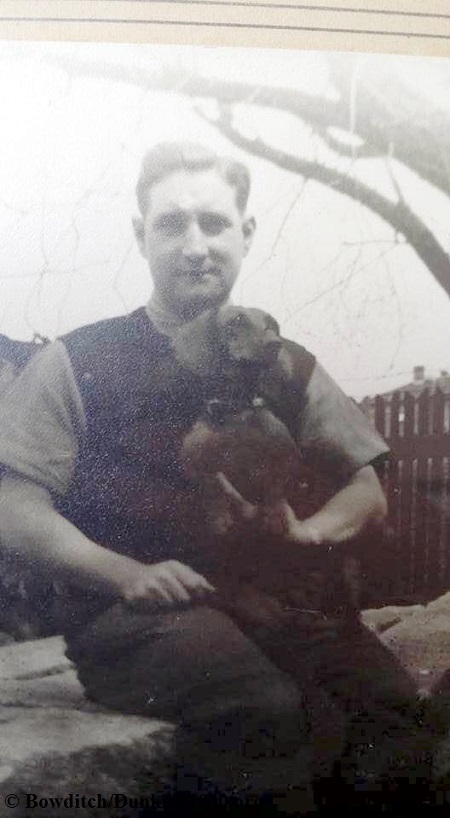Personal Account of Lance Sergeant Burtenshaw, Royal Artillery

Every person involved in the war has his own story to tell. I believe mine to be a little different. A good place is to start at the beginning, when at the age of 16; on my 16th birthday in fact I attempted to join the local T.A. Royal Artillery regiment at their HQ in Beresford Street opposite the Arsenal. The recruiting Sergeant-Major asked my age. When I said 16 he said, "Oh go outside, come in again and tell me you are 17". So there it was, I was in and under age.
As time passed, our country came closer and closer to war until eventually in 1939 it happened and we were mobilised. Within two weeks my regiment was in France where we sat out the so-called "phoney war" waiting for something to happen. Two weeks before the Germans launched their attack on France and the Low Countries I was admitted to hospital for an operation for acute appendicitis and I was in hospital recovering when the bombs fell on 10th May 1940. Three days later I was given a train ticket and told to report to a convalescent home, which had been established just outside Boulogne. The German army moved fast and within a few days everybody in the home was ordered out and marched towards Boulogne harbour in the hope of getting a ship to England.

Our hopes were dashed when it was discovered that a ship had been deliberately sunk in order to block the harbour. Orders were then given that we were to go to Le Portel to take up defence of an airfield there (Alprech). We were no more than a dozen personnel a mixed bag from various regiments. I was the only artilleryman with no weapons, no communications, no food or transport.
On reaching the airfield our little party was met by two elderly officers who had no idea what was going on any more than we did, but trying not to show it, they issued a few rifles, one between two and gave me an anti-tank rifle without any ammunition. We saw the village of Le Portel bombed and were ourselves fired on by tanks. When things got too hot it was decided to move out and try to join the main body of the British Army.

In Boulogne all was chaos and finding a railway tunnel, we walked through it hoping to find our troops at the other end. The hundreds of civilian refugees who were sheltering in the tunnel welcomed out presence. Imagine our disappointment when on reaching the end of the tunnel we found it had been blown up and there was no way out.
We turned back and as we emerged into daylight three German soldiers each armed with an automatic weapon (were waiting) who promptly demanded "Hande Hoche" – hands up – and we were taken prisoner. By this time we were joined by three sailors who had been blown into the sea when their gun turret was blown up. The Germans marched us across the cliff tops where we observed a group of French soldiers attempting to launch a rowing boat at the same time as they were being fired on by a German anti-tank crew. The boat was hit and destroyed. As for us, we were taken into a field and held for three days until more and more prisoners had been brought in.


Every person involved in the war has his own story to tell. I believe mine to be a little different. A good place is to start at the beginning, when at the age of 16; on my 16th birthday in fact I attempted to join the local T.A. Royal Artillery regiment at their HQ in Beresford Street opposite the Arsenal. The recruiting Sergeant-Major asked my age. When I said 16 he said, "Oh go outside, come in again and tell me you are 17". So there it was, I was in and under age.
As time passed, our country came closer and closer to war until eventually in 1939 it happened and we were mobilised. Within two weeks my regiment was in France where we sat out the so-called "phoney war" waiting for something to happen. Two weeks before the Germans launched their attack on France and the Low Countries I was admitted to hospital for an operation for acute appendicitis and I was in hospital recovering when the bombs fell on 10th May 1940. Three days later I was given a train ticket and told to report to a convalescent home, which had been established just outside Boulogne. The German army moved fast and within a few days everybody in the home was ordered out and marched towards Boulogne harbour in the hope of getting a ship to England.

Our hopes were dashed when it was discovered that a ship had been deliberately sunk in order to block the harbour. Orders were then given that we were to go to Le Portel to take up defence of an airfield there (Alprech). We were no more than a dozen personnel a mixed bag from various regiments. I was the only artilleryman with no weapons, no communications, no food or transport.
On reaching the airfield our little party was met by two elderly officers who had no idea what was going on any more than we did, but trying not to show it, they issued a few rifles, one between two and gave me an anti-tank rifle without any ammunition. We saw the village of Le Portel bombed and were ourselves fired on by tanks. When things got too hot it was decided to move out and try to join the main body of the British Army.

In Boulogne all was chaos and finding a railway tunnel, we walked through it hoping to find our troops at the other end. The hundreds of civilian refugees who were sheltering in the tunnel welcomed out presence. Imagine our disappointment when on reaching the end of the tunnel we found it had been blown up and there was no way out.
We turned back and as we emerged into daylight three German soldiers each armed with an automatic weapon (were waiting) who promptly demanded "Hande Hoche" – hands up – and we were taken prisoner. By this time we were joined by three sailors who had been blown into the sea when their gun turret was blown up. The Germans marched us across the cliff tops where we observed a group of French soldiers attempting to launch a rowing boat at the same time as they were being fired on by a German anti-tank crew. The boat was hit and destroyed. As for us, we were taken into a field and held for three days until more and more prisoners had been brought in.

Text and images kindly supplied by and the copyright of the Bowditch Family.
Back
Back
